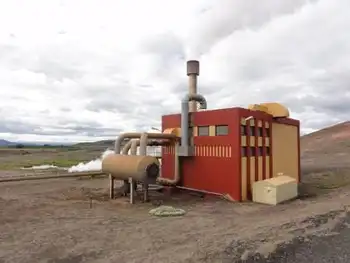CURB: Did Sebelius exert influence?
By Knight Ridder Tribune
CSA Z463 Electrical Maintenance -
Our customized live online or in‑person group training can be delivered to your staff at your location.

- Live Online
- 6 hours Instructor-led
- Group Training Available
The concern stems from a once-confidential memo written by the former chief executive of Westar Energy indicating that Sebelius and Lt. Gov. Mark Parkinson influenced utilities to pursue large-scale wind power by promising they would be "fully compensated" for any added costs of building wind plants. State policy has traditionally favored the cheapest form of energy.
A 2007 federal report projects that wind is likely to remain more expensive than coal, gas or nuclear power. A public hearing was held in Wichita on Westar's plan to add 300 megawatts of wind power to its system that serves 674,000 Kansans.
According to the company's filing, the additional wind power would cost $830 million over the next 20 years and the average customer would see a rate increase of about $2.25 a month in the early years of the plan.
David Springe, chief consumer counsel for the Citizens' Utility Ratepayer Board, said the agency wants to get to the bottom of whether the Sebelius administration has tried to influence the Kansas Corporation Commission, which sets utility rates. CURB, the state agency that represents residential and small-business utility customers, has asked two members of the commission - Thomas Wright and Michael Moffet - to recuse themselves from the case.
The third commissioner, Joseph Harkins, a former energy advisor to the governor, has already said he won't participate. KCC members are appointed by the governor but are required to act in a "quasi-judicial" role, free from politics and outside influences, when making rate decisions.
According to state law, if the remaining two commission members do not step down from the case, they will have to publicly state the reason for their decision. Corporate shift CURB vice chairman Randy Brown said he found it suspect that Westar and other companies' lack of enthusiasm for wind energy did an about-face after their chief executives met with the governor.
Brown said CURB supports wind power as part of the Kansas energy mix but wants it to be as economical as possible. The board unanimously approved making the recusal request to ensure that the commission's decisions remain independent, he said.
"It's not the governor's job to make assurances about utility rates," he said. Westar vice president Jim Ludwig acknowledged that the company rejected wind in 2004 as too costly. But the rising construction cost of new coal plants and the prospect of a "carbon tax" on greenhouse gas emissions is making the costs more comparable, he said. "The economics are shifting," Ludwig said.
"There are credible scenarios where a combination of wind and natural gas can be price competitive." Commission spokeswoman Rosemary Foreman said the commissioners plan to issue their decisions on the recusal request late this week.
In a written statement, the governor's office said: "The implication by CURB is off base. The Governor has never advised members of the KCC which utility applications they should approve, how they should set rates, or what those rates should be." However, an administration spokesperson declined to answer questions from The Eagle about whether the governor or lieutenant governor had urged the commission in general terms to support wind.
Also unanswered was a question of how the governor could assure the utilities' investment in wind would be compensated without exerting influence on the commission.
The e-mail memo at the heart of the issue was written on Dec. 21, 2006, and obtained by CURB in a data request in connection with the Westar case. In it, Westar's then-chief executive James Haines tells members of his staff that he and the heads of five other Kansas utilities met with the governor and then-Lt. Gov.-elect Parkinson.
In the meeting, Sebelius sketched out her plan - later made public in her State of the State address - to have Kansas get 10 percent of its energy from wind by 2010 and 20 percent by 2020, the memo said.
"The governor recognized that, for some companies, in the short run adding wind will increase cost," the memo said. "She further recognized that historically the rate-making standard at the KCC has emphasized the lowest cost means to achieve load. She indicated that the policy initiative will address this historical practice and will change it so that companies that commit to wind will be fully compensated."
Later, the memo said Parkinson asked the company heads to commit to the governor's wind plan. "I said that with the assurances that were made regarding cost recovery, that Westar would do its share, as did the other CEO's for their companies," Haines wrote.
A meeting schedule attached to CURB's filing shows five more meetings between Parkinson and Westar executives between Feb. 6 and Oct. 3, and one May 25 news conference with the governor and utility chief executives to discuss wind energy and conservation measures.
Revelation of the memo could increase friction between the governor and conservative legislators, who were already at odds over the administration's rejection of a coal-fired power plant in western Kansas. Sebelius appears to have made promises she couldn't keep unless she controlled what is supposed to be an independent utility commission, said Rep. Peggy Mast, R-Emporia, a member of the House Utilities Committee. She said she thinks Sebelius is trying to buff up her national image as a "green" governor, at the expense of Kansas electric ratepayers.
"The governor is making arrangements for her own benefit at the cost of her constituents... completely negating her responsibility to the people who are paying for it," she said. "I'm really not surprised, but to have it down in black-and-white where there's proof is astonishing."
The governor's statement said that neither she nor Parkinson did anything wrong. "On the meeting described, the governor and lieutenant governor did indicate that their intent was to let the state as a whole know of their support of wind; and they have done that," the statement said.
"They also acknowledged that electric utilities need to be compensated for costs of energy they develop." State officials were uncertain on how Westar's case will be handled if the commissioners all recuse themselves. Under state law, the KCC apparently would have to contract to have the case heard by another state agency, officials said.











